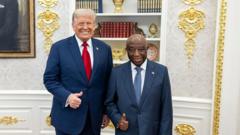This article explores the implications of Trump's aggressive tariff tactics and the legal questions they raise about the boundaries of presidential power.
**Trump's Tariff Threats: A Political Weapon Aimed at Brazil**

**Trump's Tariff Threats: A Political Weapon Aimed at Brazil**
In a recent move, President Trump has wielded the power of tariffs not just as an economic tool, but as a means to influence foreign political matters, specifically targeting Brazil and its treatment of former leader Jair Bolsonaro.
President Trump has historically employed tariffs as instruments for revenue enhancement, support for domestic manufacturing, and facilitation of American exports. This week, however, he escalated his approach by linking a potential 50 percent tariff on Brazil to the nation's political climate involving former president Jair Bolsonaro. Trump condemned Brazilian authorities for their handling of Bolsonaro, who faces allegations of attempting to retain power illegally following his electoral defeat in 2022. He characterized their actions as a "Witch Hunt" and issued a stark warning that unless Brazil improved conditions for Bolsonaro, severe trade penalties would ensue.
Legal experts have raised concerns regarding the legality of Trump's tariff threats, emphasizing that the U.S. Congress holds primary authority over taxation on imports. Although the president can impose tariffs under specific legal circumstances, traditionally these powers pertain to national security rather than political maneuvering. Trump's rhetoric underscores a significant departure from conventional tariff use, stirring up fresh debate around executive overreach.
While claiming economic motivations, Trump mistakenly asserted that the United States has a trade deficit with Brazil, when in fact, American exports to Brazil surpass imports. This discrepancy illustrates the complexities of merging trade policy with geopolitical motives, showcasing a blend of domestic political strategy and international trade relations that can have far-reaching consequences.





















